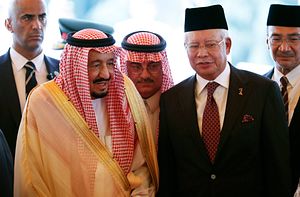Last week, Malaysia’s defense minister made headlines when he suggested that the new government that had come to power following elections last month may review the Southeast Asian state’s military presence in Saudi Arabia. Though scrutiny surrounding this aspect of Malaysia’s involvement is far from new, the comment has nonetheless raised questions about what this could mean for the country’s approach to the Middle East as well as its foreign policy more generally.
As I have noted before in these pages, under the previous government led by Prime Minister Najib Razak, Malaysia had taken a series of steps that suggested a closer alignment with Saudi Arabia amid growing turmoil in the Middle East and the rising threat presented by the Islamic State. This included sending armed personnel and equipment to Riyadh back in 2015 for the expressed objective of evacuating people trapped in Yemen – both its own citizens as well as those of neighboring states – with the help of Arab states and aid agencies.
Since then, there has been increased scrutiny on that presence as well as other related activities Malaysia has taken part in – such as its decision to join a Saudi-led, 34-member Islamic alliance against the Islamic State, its participation in certain military engagements with partner countries, and the opening of a center with Saudi Arabia to counter radical narratives called the King Salman Center for International Peace (KSCIP) (See: “What’s Malaysia’s Role in the New Islamic Anti-Terror Coalition?”).
Despite denials by officials, perceptions had remained that the Najib government was having an overly warm relationship with Riyadh that could have implications for Malaysia’s foreign policy, including more direct involvement in military operations by the Saudi-led coalition against Iran-backed Houthi rebels in Yemen, and the negative perceptions regarding those activities more generally as well.
Despite the concerns, the Najib government had persisted with some of those key initiatives. With respect to troop presence in particular, last October, then-Defense Minister Hishammuddin Hussein had suggested that even though the original purpose for the deployment of personnel in Riyadh was to assist with the evaluation of Malaysians in Yemen, that presence would remain in Saudi Arabia to assist with humanitarian assistance and rebuilding efforts. But with a new government coming to power following elections in May, there was a sense that some of this cooperation could be reviewed or even potentially terminated.
Last week, some signs of that began to surface when Malaysian Defense Minister Mohammad Sabu suggested that Malaysia would review its troop presence in Saudi Arabia. In a statement issued on June 20, Mohamad indicated that even though the personnel had been on standby to evacuate Malaysians in Yemen and had never been involved in military operations, that presence in Saudi Arabia had “indirectly mired Malaysia in the Middle East conflict” despite the country’s long-held preference for neutrality. He added that the government would make a decision on the matter “in the near future” after the completion of a re-evaluation.
Mohamad’s comments themselves are neither surprising nor controversial, despite the headlines they have produced. The new PH government has in fact suggested a number of areas where it wants to review the policies of the previous administration, and this is just one of them. Furthermore, given the changes in the regional developments since the original decision for a troop presence was made and perhaps even some broader adjustments for Malaysia’s outlook that the government may have in mind, there could also be a legitimate case for reconsideration.
Yet the focus on the decision is nonetheless understandable. With the advent of a new government, Malaysians as well as outside observers will be looking to see how it manages not only the manifold domestic issues that need addressing, but how it performs in the foreign policy realm more generally. Within that context, the troop presence, along with other comments by officials on the future of initiatives such as the KSCIP has already been seen – rightly or wrongly – as a litmus test for Malaysia’s relations with Saudi Arabia and the Middle Eastern states more generally, with suggestions that Malaysia could be moving into a period of cooler or at least less warm relations with Riyadh relative to the Najib years.
To be sure, it is still early days, and one should avoid jumping to too many conclusions too early with respect to the new government’s approach to foreign policy. Even the broad parameters of that are still yet to be cleared up, and there are too few data points at this stage to suggest anything concrete. At the same time, that will not stop observers from speculating either, especially if officials keep raising new questions about old policies as was the case here.































